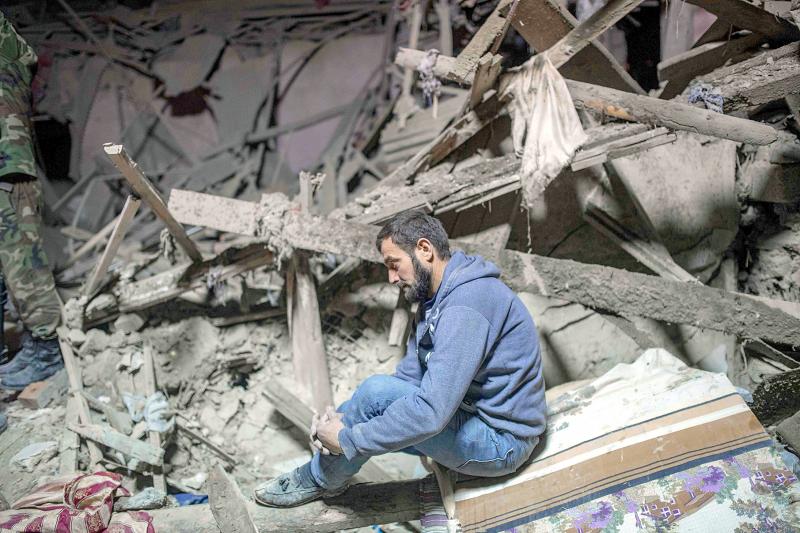A missile strike yesterday leveled a row of homes in Azerbaijan’s second-largest city of Ganja, killing 12 and injuring more than 40 people in their sleep in a sharp escalation of the conflict over the disputed Nagorno-Karabakh region.
The early hours attack, which saw a second missile strike another part of Ganja and a third reach the nearby strategic city of Mingecevir, came hours after Azerbaijani forces shelled the ethnic Armenian separatist region’s capital Stepanakert.
The seeming tit-for-tat attacks further undermines international efforts to calm a resurgence of fighting between Christian Armenians and Muslim Azerbaijanis before it draws in regional powers Russia and Turkey.

Photo: AFP
Witnesses in Ganja saw rows of houses turned to rubble by the strike, which shattered the walls and ripped the roofs off buildings in the surrounding streets.
People ran outside in shock and tears, stumbling through dark muddy alleys in their slippers, some wearing bathroom robes and pajamas.
The attack came only six days after a missile struck another residential part of the city of more than 300,000 people, killing 10 civilians and leaving many on edge.
At the scene of the latest strike, exploding shells rumbled in the distance as rescuers and red helmets used sniffer dogs to search for signs on life.
“We were sleeping. The kids were watching TV,” Rubaba Zhafarova, 65, said in front of her destroyed home.
“All the houses around here are destroyed. Many people are under the rubble. Some are dead, some are wounded,” she said.
Hikmat Hajiyev, an assistant to Azerbaijani President Ilham Aliyev, wrote on Twitter that according to “initial information, more than 20 houses were destroyed” yesterday.
In televised remarks, Aliyev vowed to strike back against Armenia, saying that the Azerbaijan’s army would “take revenge on the battlefield.”
Nagorno-Karabakh’s military said that Azerbaijani forces had stepped up their attacks on Friday across the front, shelling Stepanakert and the nearby town of Susi.
The separatists “carried out equivalent operations to stop adversary fire,” they said in a statement released by the Armenian government.
Rescuers periodically called for silence so they could hear the sounds of survivors as the hours passed, pulling passports, keys, bracelets and items of clothing from the debris.
They called in sniffer dogs and watered down the suffocating columns of dust with hoses from a fire truck.
“One woman was missing her feet. Someone else was missing an arm at the elbow,” said Elmir Shirinzaday, 26, in a visible state of shock.
Rescuers struggled to lift heavy boulders of rubble in search for signs of life, periodically taking breaks to try and calm distraught victims.
“My wife was there, my wife was there,” one man cried inconsolably while being walked toward an ambulance by a paramedic.
At around the same time in Mingecevir, an hour’s drive north of Ganja, witnesses reported hearing the impact of a huge blast that shook buildings.
The city is protected by a missile defense system because it is home to a strategic dam, and it was not immediately clear if the missile was destroyed or had made impact.

POLITICAL PRISONERS VS DEPORTEES: Venezuela’s prosecutor’s office slammed the call by El Salvador’s leader, accusing him of crimes against humanity Salvadoran President Nayib Bukele on Sunday proposed carrying out a prisoner swap with Venezuela, suggesting he would exchange Venezuelan deportees from the US his government has kept imprisoned for what he called “political prisoners” in Venezuela. In a post on X, directed at Venezuelan President Nicolas Maduro, Bukele listed off a number of family members of high-level opposition figures in Venezuela, journalists and activists detained during the South American government’s electoral crackdown last year. “The only reason they are imprisoned is for having opposed you and your electoral fraud,” he wrote to Maduro. “However, I want to propose a humanitarian agreement that

ECONOMIC WORRIES: The ruling PAP faces voters amid concerns that the city-state faces the possibility of a recession and job losses amid Washington’s tariffs Singapore yesterday finalized contestants for its general election on Saturday next week, with the ruling People’s Action Party (PAP) fielding 32 new candidates in the biggest refresh of the party that has ruled the city-state since independence in 1965. The move follows a pledge by Singaporean Prime Minister Lawrence Wong (黃循財), who took office last year and assumed the PAP leadership, to “bring in new blood, new ideas and new energy” to steer the country of 6 million people. His latest shake-up beats that of predecessors Lee Hsien Loong (李顯龍) and Goh Chok Tong (吳作棟), who replaced 24 and 11 politicians respectively

Young women standing idly around a park in Tokyo’s west suggest that a giant statue of Godzilla is not the only attraction for a record number of foreign tourists. Their faces lit by the cold glow of their phones, the women lining Okubo Park are evidence that sex tourism has developed as a dark flipside to the bustling Kabukicho nightlife district. Increasing numbers of foreign men are flocking to the area after seeing videos on social media. One of the women said that the area near Kabukicho, where Godzilla rumbles and belches smoke atop a cinema, has become a “real

‘WATER WARFARE’: A Pakistani official called India’s suspension of a 65-year-old treaty on the sharing of waters from the Indus River ‘a cowardly, illegal move’ Pakistan yesterday canceled visas for Indian nationals, closed its airspace for all Indian-owned or operated airlines, and suspended all trade with India, including to and from any third country. The retaliatory measures follow India’s decision to suspend visas for Pakistani nationals in the aftermath of a deadly attack by shooters in Kashmir that killed 26 people, mostly tourists. The rare attack on civilians shocked and outraged India and prompted calls for action against their country’s archenemy, Pakistan. New Delhi did not publicly produce evidence connecting the attack to its neighbor, but said it had “cross-border” links to Pakistan. Pakistan denied any connection to